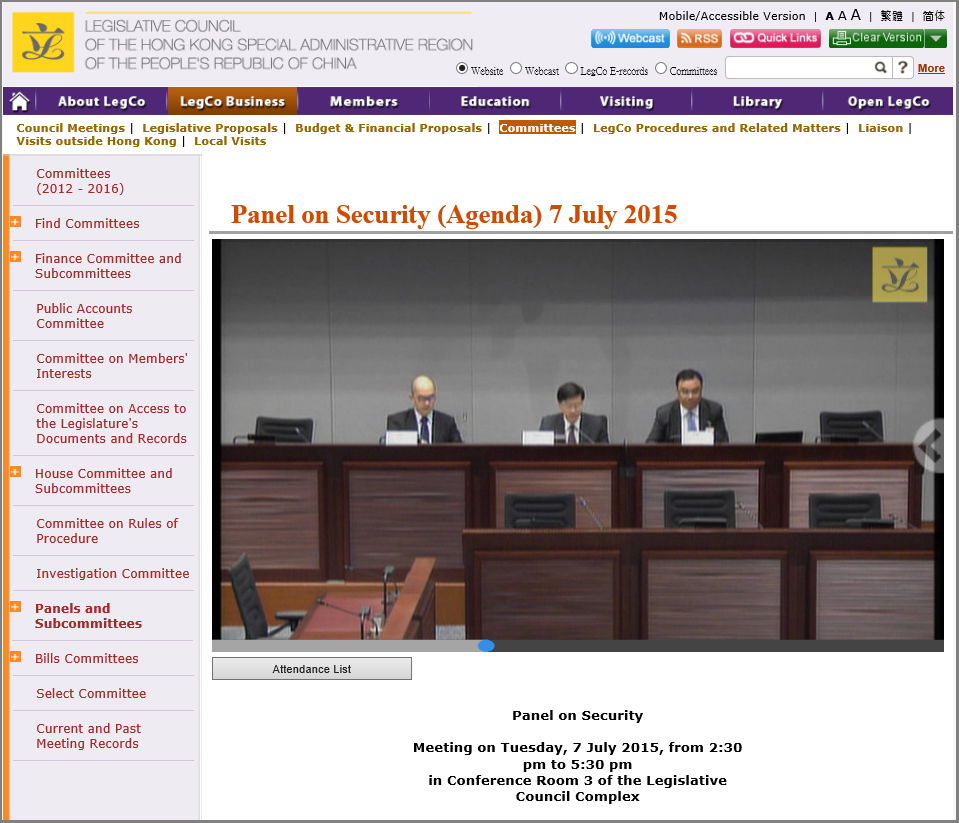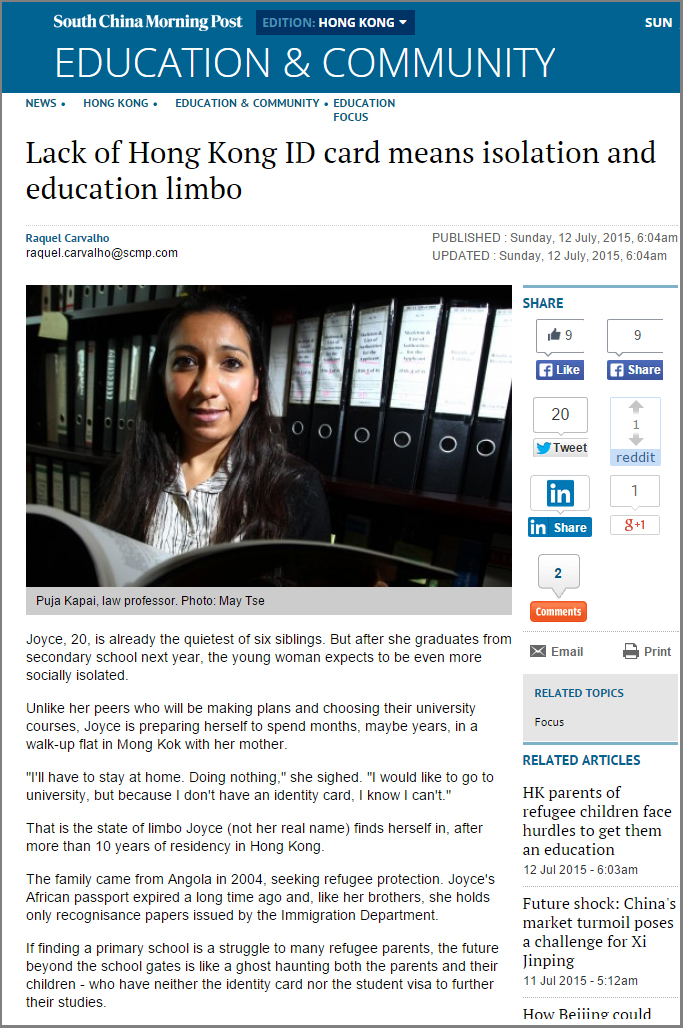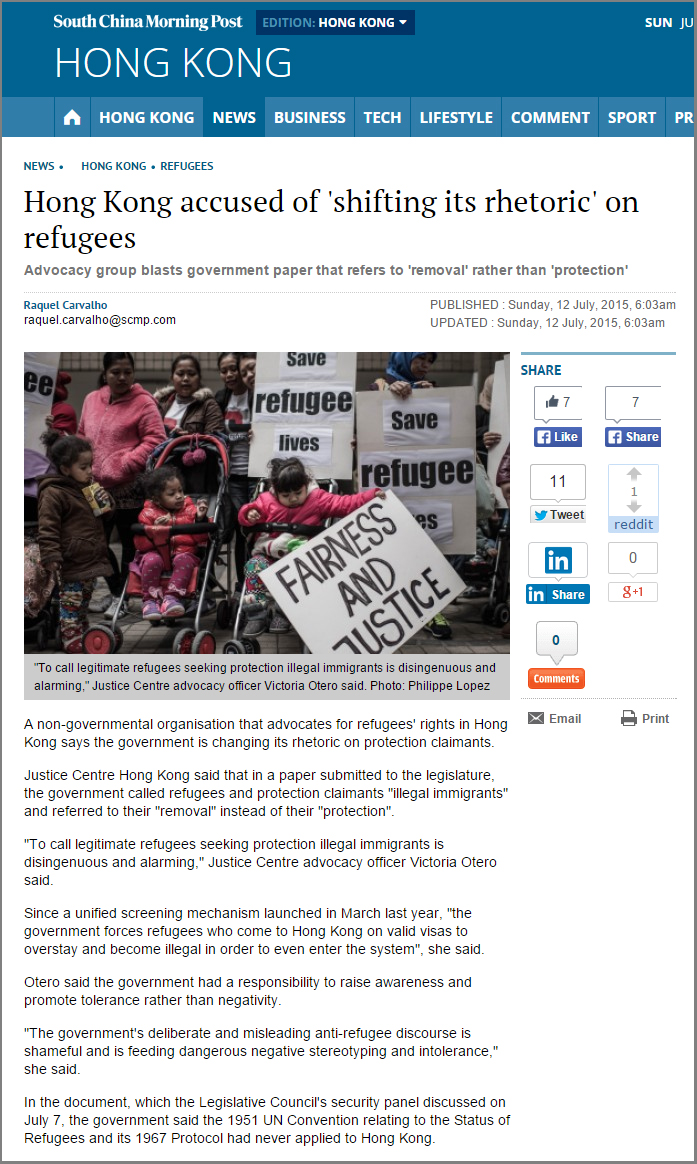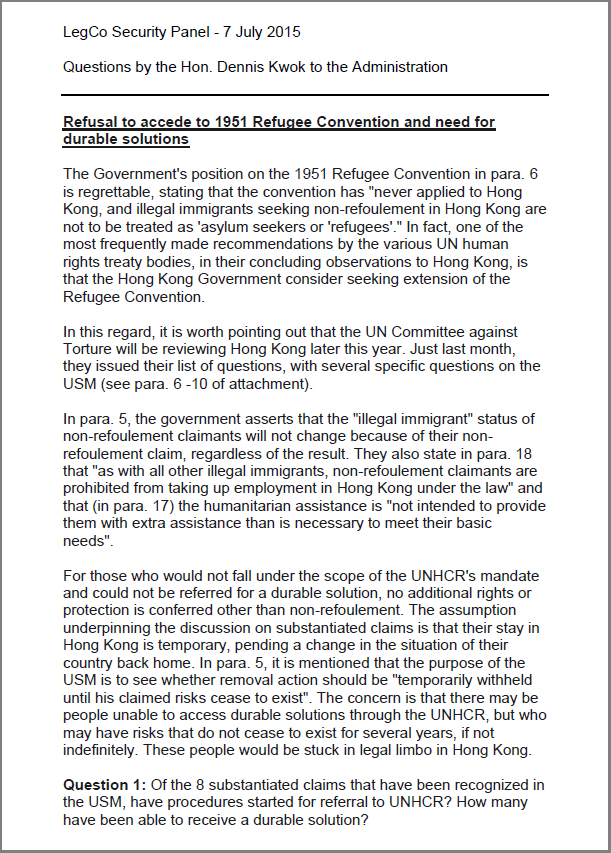Archive
Shedding light on a misleading government press release
Aug 5th, 2015 | Government, Immigration, Media, Rejection, VF Opinion | Comment
Government propaganda appears to be formulated to malign refugees by tossing anyone who dares to seek asylum in the “illegal immigrant” dumpster. Is the depiction of refugees as illegal immigrants justifiable? Let’s start with the facts:
On 30 July 2015, Immigration refused entry to six foreigners who landed at the Hong Kong International Airport. Three of them were Indians arriving from Delhi, while the others were a mother and two children flying from Ethiopia. After being denied entry, all six applied for asylum by raising non-refoulement claims through the Unified Screening Mechanism (USM), thus blocking removal proceedings.
A government Press Release followed the next day, reported by several media outlets including:
– Six passengers refused permission to land lodge claims for non-refoulement
– 6旅客甫抵港即提免遣返聲請入境處調查
– (TVB) 六旅客被拒入境聲請免遣返疑事先策劃
The report appears to reveal what is an alarming problem. Attention should be drawn to these statements in particular: “while waiting for removal, the legal representative (of the Indians) lodged claims”, “for the three African passengers, a non-governmental organisation had already informed ImmD”, “the African female admitted that their travel documents did not bear their genuine identities”, “all of them lodged claims soon after they had been refused permission to land”, “ImmD will conduct further investigation on whether or not there is any person who intentionally arranged … to lodge claims”.
The media presented the above information as arguably indicative of abuse. Yet, Vision First claims the above actions and information are essential to due and fair process. It is a constitutional right of individuals to seek protection against refoulement. It is not a loophole in legislation.
Further, let’s consider:
- Hong Kong welcomed more than 5 million visitors a month in 2014. As one of the busiest tourist and transit hubs in the world, it is unremarkable that on average 20 asylum seekers sought government protection at control points every month last year. Considering international migration/refugee challenges, one might ask: Why so few?
- The legal representative for the Indians should not be singled out for assisting claimants “waiting for removal”, as if the asylum process were thus abused. The lawyer was simply doing his job advising clients who requested assistance in the process of seeking asylum. The claimants were smart to hire a lawyer who should be praised for resisting and (temporarily) succeeding against the state machinery that would otherwise have probably deported his clients.
- The press release fails to report that the African husband is a mandated UNHCR refugee attempting to reunite with a family he originally separated from when he fled abroad. Immigration knew this from interviews supported by documents, yet chose to depict the “African female” as a deceitful abuser in possession of fake passports. In fact it is legally acceptable for refugees to flee to safety with any documents that will achieve that objective.
- The press release fails to report that Immigration officers refused entry to the African mother and children (boy 6, girl 5) when they sought asylum earlier this year at the SkyPier at the Hong Kong International Airport. On that occasion, the mother submitted that her husband was a UNHCR refugee in Hong Kong and they would face danger if returned to Africa. It is disconcerting that her protection pleas were ignored and the family was removed without further investigation.
- The press release avoids stating that the NGO in question was the Refugee Union, perhaps to deflect attention from the valuable assistance the society offers refugees in need of advice and communication with government departments. It is reported that the husband of the African family sought the assistance of the Refugee Union that competently liaised with Immigration and secured the release of the mother and children in two days.
- No consideration is given to the basic legal principle that any asylum claim ought to be treated as genuine until the entire screening process is concluded. The press release instead seems to presume that the 3 Indians and 3 Africans were troublesome abusers of an otherwise fair asylum process. What are persecuted foreigners expected to do if raising claims at the airport is considered reprehensible?
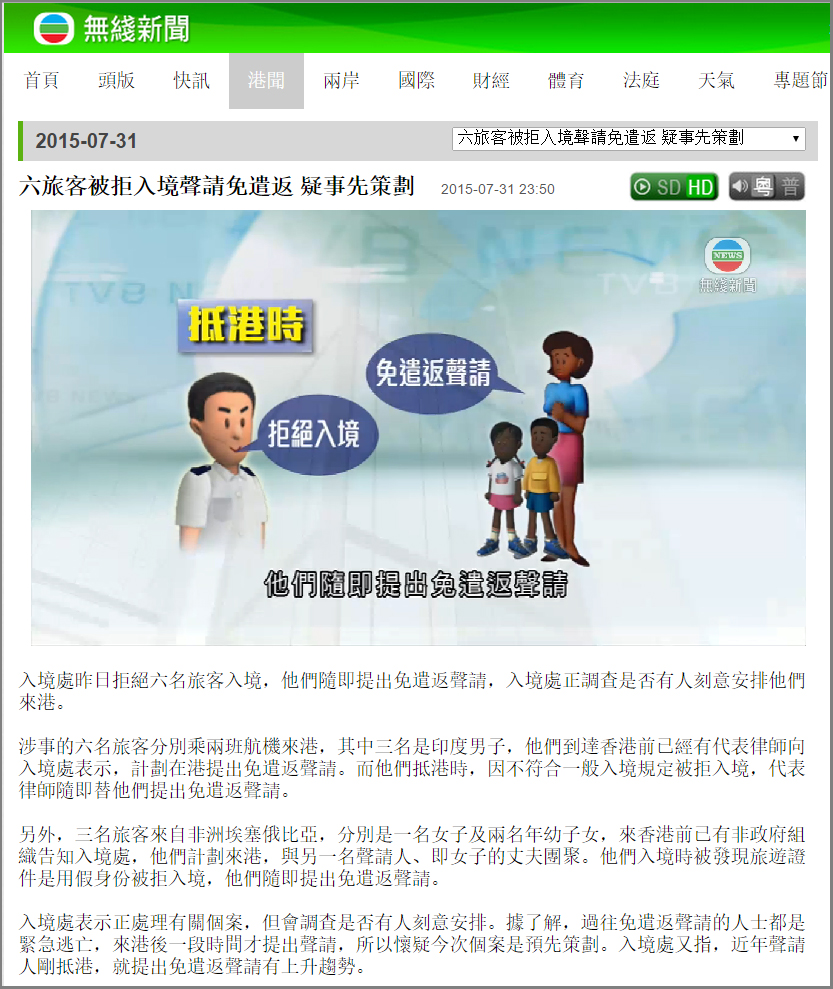
Immigration wastes 70,000 years in refugee lives
Aug 4th, 2015 | Immigration, Personal Experiences, Welfare | Comment
Hello, call me Outsider because I sought asylum in Hong Kong three years ago.
Recently there have been some sinister changes in the description of asylum seekers by the Government. One of the most sophisticated is turning the table on refugees by branding everyone an “illegal immigrant”. This wrong-minded propaganda does nothing to resolve the underlying issues. How many meetings were held? How much time and money were spent to come up with this brilliant idea?
Let’s look up the definition of “immigrant” (not illegal because refugees in HK have Immigration papers): a person who comes to live permanently in a foreign country. This definition has nothing to do with refugees. To label a group of people the first step should be getting to know them and understand their identity, narrative and objectives. One should understand who they are, not how we perceive them (prejudice), or how society treats them (discrimination). I suspect that Government is labeling refugees with the malicious aim of fueling public resentment and hostility.
Take my experience as an example. When I fled my country, where I was an established professional by the way, I was not dreaming of living in another country, particularly not Hong Kong. I cannot speak Chinese and I don’t practice kung fu, which is what this city was famous for where I grew up. Put simply, my objective was to save my life. I was arrested when leaving Hong Kong, not entering the city. I had no intention of staying, but have been stuck for three years already against my will.
Labelling refugees is aimed at residents, as it hardly affects who refugees are and how we evaluate the hostility we experience. I prefer to call myself a “runner for life” as I ran to save my life. No doubt you would have done the same! You can also call me an “outsider” as Hong Kong isolate me and makes me feel unwelcome. The Government does considers my needs, nor permits me to work to make a living.
Refugees most of all hate labels that are lies. I for one suspect that the Government is attempting to cast a negative name on refugees to stoke recrimination and hatred against our community, because they know that in truth it is the government policies that are to blame for the asylum mess in Hong Kong.
Some simple economic considerations might help to illustrate this problem:
There are about 10,000 refugees in Hong Kong who waste an average of 7 years to receive a (negative) decision on their asylum claim. Each refugee cost at least $3000 a month for rent and food, not including the cost of administration, lawyers, social workers, policing and detention. The total welfare amount alone is $2,500,000,000. Considering an average monthly salary of $7500, it would pay for 28,000 years of salaries!
I am outraged at the years and lives destroyed by the asylum process. How many years, and the most productive ones for that matter, does Immigration steal from refugees in the prime of their life? It is more than stealing because something stolen can be returned. Immigration is murdering 7 precious years that we can never get back. It is a priceless loss for persons in their twenties and forties who will never get their productive years back! Rejected after seven years of stress and pressure, nobody is the same person … people are lost, mentally broken, some even go crazy!
With the asylum process taking an average of 7 years, the above 10,000 refugees are expected to waste 70,000 years in Hong Kong, or the equivalent of about 1000 lifetimes. This is a tragedy and it doesn’t make sense to me. The result is that the current asylum process puts to waste 70,000 productive years (not young or old) and 2.5 billion dollars without accountability or consequence.
It is clear what Hong Kong Government has accomplished with 70,000 man-years and 2.5 billion dollars – nothing! What could the authorities do differently? WHAT WOULD YOU DO? How would you leverage these resources while finding a fair solution to the refugee dilemma? As Hong Kong takes great pride in its economic achievements, is it really impossible to productively deploy such manpower and capital?
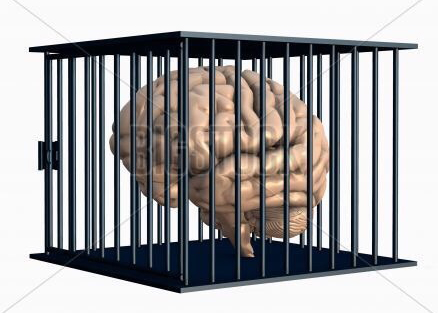
Refugee alleges forced deportation without proper screening
Jul 24th, 2015 | Crime, Detention, Immigration, Rejection | Comment
On 23 July 2015, Vision First was contacted by a member who alleges that Immigration deported him to Nepal with questionable tactics, prior to the commencement or completion of USM screening.
The conversation below, edited for clarity, raises a host of troubling questions:
- Why was the refugee jailed for illegal entry after 2 years on bail?
- Why does the refugee complain that Immigration officers “forced me” to sign documents?
- Why was the refugee threatened with imprisonment if he didn’t sign?
- Why didn’t Immigration translate and provide copies of such documents?
- Why wasn’t the USM screening completed, if commenced at all?
- If a USM Notice of Decision was issued, why wasn’t a copy given to the refugee?
- Why didn’t an interpreter translate the Notice to the refugee?
- Why was the refugee denied the right to appeal?
- How did the assigned duty lawyer defend the refugee?
- Did the duty lawyer ensure a high standard of fairness?
Click here to download a PDF of the conversation
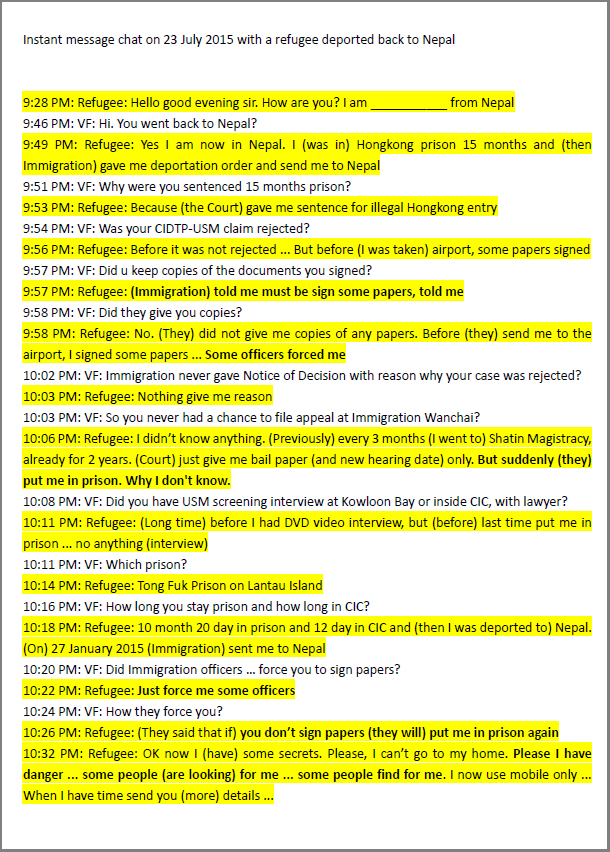
Inside prison I work for the government
Jul 22nd, 2015 | Crime, Housing, Immigration, Personal Experiences, Welfare | Comment
I am scarred because I don’t want to go back to prison. I was sentenced to 15 months for working to support my family, but I didn’t do anything criminal. In my mind, it was political persecution because refugees don’t have a straight road to walk. We go the wrong way because we don’t get enough assistance. We work to pay rent and buy food, but the police arrest us for “unlawful employment”.
I am a South Asian refugee mother with two daughters. Honestly I tell you, it is impossible for us to live with 3000$ rent and food coupons. Refugees need cash for many things, like going to the market and buying Pampers, clothes and school supplies. That is why we must do part-time job for our families in the day to day struggle. Also, my mother back home is sick, but I have no money to help.
In 2012, I was arrested at a fish restaurant in Tuen Mun. The police catch me and my offence is taking unlawful employment. Now I wish to unburden myself and tell the truth that the judge did not consider. The ISS assistance did not pay my full rent and utilities. I have no husband so I have to worry about my girls and everything I have to buy for them. That is why I have to do work before and now.
I tell my problems to my case officer but she cannot help. “This is the rules”, she always tells me so I know that I have to find a way by myself. If the landlord kick us outside, what will happen to my girls? My friend introduced me to a boss who paid me 400$ to wash dishes all day. There is other work for women, but it is not acceptable for me because it is very dangerous and I have children.
Why inside prison have so many refugees working? Many resident prisoners refuse to work, or have mental problems, or do drugs before. Refugees are strong and hard-working. Inside prison we work for the Government of Hong Kong, for example, washing and ironing uniforms and hospital sheets. They pay us 5$ a day and get cheap labour from thousands of men and women refugees who cannot work outside. Why does it happen like this?
Before I am outside and I work for my family. When police catch me they send me to prison. Then I am inside prison and I work for the government. But still I am working: outside it was illegal because I cannot help the government, but inside it is legal because I can help the government. Would it be fairer for Immigration to let refugees work outside to buy what we need and not do crime?
Inside prison I cannot refuse to work because the officers shout at me. I must do the jobs that they give me all the morning and afternoon, also on Sunday. So please tell me if this is fair to refugees? Outside I cannot do work, but must survive without enough assistance. Inside I must do work like a slave for the Government for 15 months without a holiday and without choice. Is this right?
I don’t want to go back to prison. The police tell me that if catch again, next time they will fine me 50,000$ and put three years in prison. Now I don’t know how I can buy something that my daughters need. Every day and night I am going mentally sick and depression. Refugees are always scared of going to prison, even if their children are born on Hong Kong land and never see their parents’ country.
Also refugees have dreams for their future. I want a safe and healthy life for my children. I want them to be happy and not suffer like this. But what can I offer them? We cannot go back to my country and Hong Kong does not let us stay. I dream of a better future when I can do something good for children, because today they suffer too much.
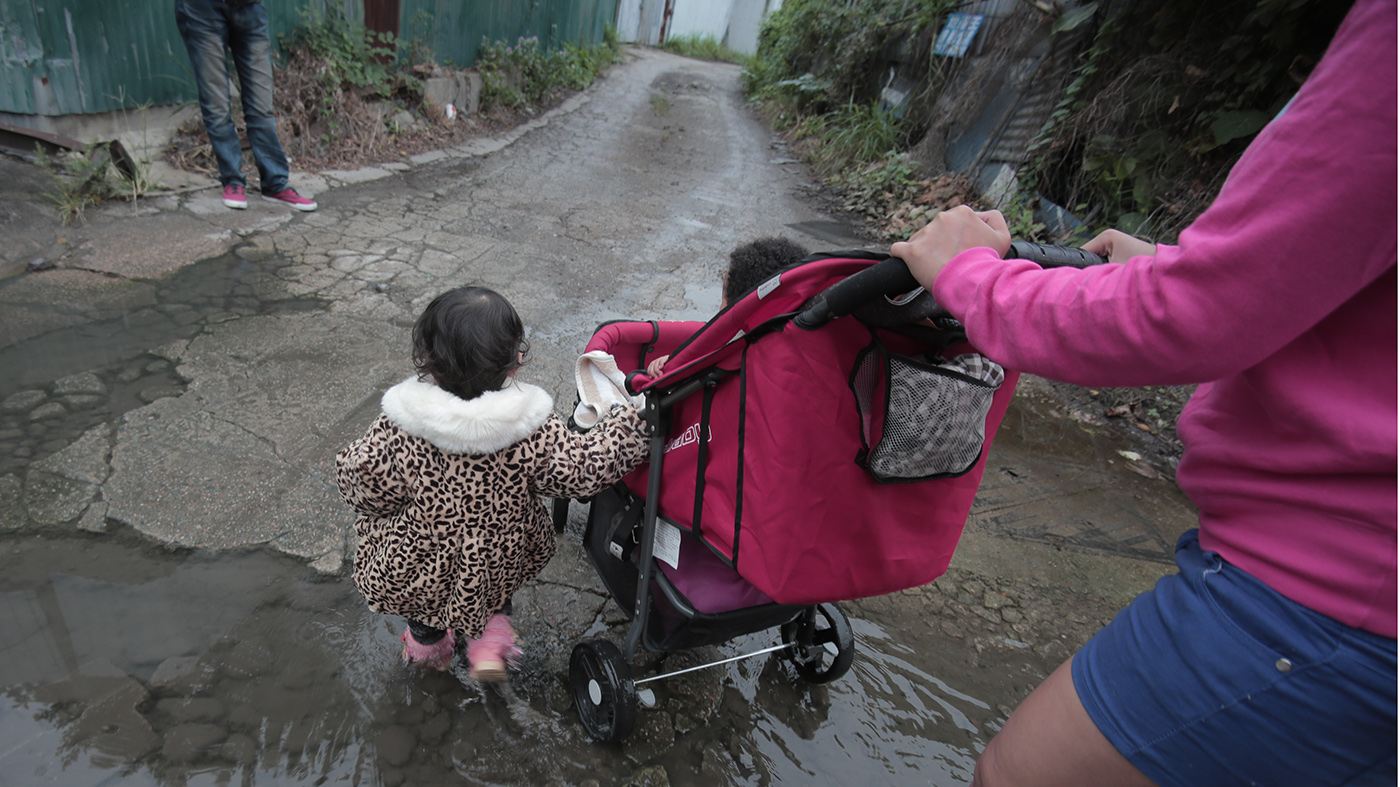
Ahmadiyya community seeks empowerment by Vision First
Jul 17th, 2015 | Advocacy, Immigration, Personal Experiences, Rejection | Comment
Rashid, 45, fits immigration profiling that perpetuates the department and city-wide culture of rejection: he is Pakistani and was convicted in 2001 for possessing a fake ID card; he was deported, but returned illegally in 2007 by speedboat; he overstayed 7 years before VF arranged his surrender to Immigration; he admits to working illegally to make ends meet and send money to family members who depend on him.
The question is: Is Rashid abusing the asylum process?
“If we can see the moon tonight then Ramadan is finished, otherwise we shall wait one more day,” explained Rashid as he welcomed us into a peaceful village compound for the Eid festivity that marks Ramadan’s end. Rashid belongs to the Pakistani Ahmadiyya minority. The community president explained the religious persecution, “Ahmadis were formed in 1889 in India from a Sunni branch. In 1903 the center was moved to Punjab and we are now based in 206 countries, with our Chief Imam in exile in London. In 1974 the Pakistani government amended the constitution and declared Ahmadis non-Muslim sparking discrimination, persecution and murders, often instigated by firebrand mullahs who preach that killing Ahmadi is a pious act rewarded by virgins in Heaven!”
When the family fled persecution and violence, Rashid came to Hong Kong, while his wife and children fled to Thailand. They were eventually recognized as refugees by the UNHCR in Bangkok and resettled to the Unites States. The heartbroken father explains that other relatives also gained refugee status in the UK and Canada. He explains that “Before there were 250 Ahmadiyya refugees in Hong Kong, including children. Now we are only 70 as many moved to other countries with the help of UNHCR, or through private sponsorship. There is no future for our people in Hong Kong.” The Unified Screening Mechanism (USM) seems to have worsened their prospects.
“We need to empower our community,” Rashid requested, “because the UNHCR is closed and Hong Kong Government does not understand or accept us. Our community is persecuted to death and Immigration tells us to move to live in other cities in Pakistan. How is that possible? Our passports and ID cards state we are “Ahmadi” and there is no safety anywhere after you name is on the kill list. Those who murder us are celebrated … even by the police!”
An agitated elderly member interrupted, “Immigration rejected my claim! They said that false police charges are a personal problem and I should have complained to other department, as written on some website. What good is that? My neighbours attacked us to steal our family business because I am Ahmadi. No other reason! The police took no action to stop them and then made false charges to arrest me. Since the (anti-Ahmadiyya) Ordinance thousands have been murdered. I had to escape to save my life. That is the truth!”
After sharing a prayerful moment, the community leaders asked about Vision First’s activism and empowerment they had heard about from a handful of active members. The president encouraged the development, “The Ahmadis are known for being peaceful. We don’t believe in strikes. Instead we pray that Allah will change our enemies’ hearts. But today we understand we need organization because Immigration does not understand our problems. We wish to provide our documents and evidence to explain the religious persecution we suffer in Pakistan. We live in exile here.”
The president recently learned a lesson about dealing with Immigration. He reported, “We applied for a visa for an Imam as the community needs religious teaching. But Immigration refused three times. After we contacted a lawyer and he threatened to go to court, Immigration wrote back that it was not necessary and the application would be accepted in seven days. Three days later the visa was issued! So we understand that without pressure it is hard to win in Hong Kong.”
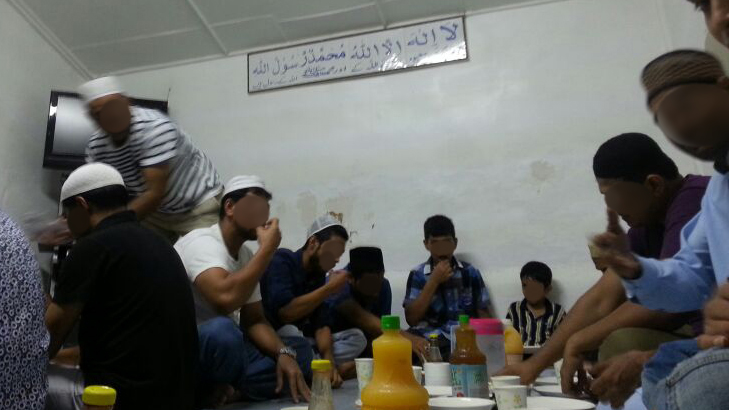
Lack of Hong Kong ID card means isolation and education limbo
Jul 12th, 2015 | Immigration, Media, Personal Experiences, Rejection | Comment
Hong Kong accused of ‘shifting its rhetoric’ on refugees
Jul 12th, 2015 | Immigration, Media, Rejection | Comment
Lawmaker Dennis Kwok questions to Legco Security Panel
Jul 9th, 2015 | Government, Immigration, Rejection | Comment
Misinformation raises hysteria around refugee abuse
Jul 8th, 2015 | Immigration, Rejection, VF Opinion | Comment
The Legislative Council Security Panel meeting of 7 July 2015 failed to shed light on the structural problems that have drawn criticism to the Unified Screening Mechanism (USM) and its questionable 0.5% acceptance rate. The Security Bureau report that “amongst the 1873 non-refoulement claims determined by Immigration, 8 are substantiated”, figures that were sensationally echoed in the Chinese press as “99.5% of non-refoulement claimants are false”. Is that really the truth?
Vision First introduced the discussion on acceptance rates in 2012, when we first questioned the credibility of the Immigration Department’s effective Zero Percent Acceptance Rate that not only fails to protect persecuted foreigners, but is manipulated to brand refugees as abusers who should be expeditiously deported. Statistics however are only useful if provided with context and analysis.
A case in point is the period refugees wait for decisions – namely rejection. The Security Bureau reported that “since the commencement of USM, it takes Immigration about 25 weeks on average to decide on a claim”. However such an average is limited to the 1873 cases already determined. It does not include hundreds of refugees who arrived many years ago and, either have not been screened, or still await first-tier or second-tier determinations.
Vision First is aware of numerous refugees whose Torture Claims, in some cases filed years before the USM was launched, were not decided. The authorities have suggested that they may request prioritized screening, but what incentive do they have with a 99.5% certainty of being refused and then facing removal into harm’s way? Is it possible that Immigration avoids determining cases that are hard to refuse and might then cause embarrassment through judicial reviews? Some of these refugees have waited more than a decade.
It is certainly staggering that since the USM was launched in March 2014, a record 6461 new claims were lodged, a 250% increase on the previous year. The figure is greater than the entire refugee population was in early 2014 and might be indicative of Hong Kong’s growing status as a global city that attracts persecution, labour and poverty-induced migration. Hong Kong is apparently unable to categorize and manage them all effectively.
An analysis of the recent surge is beyond our scope. One might however consider the fact that Hong Kong has no temporary migration scheme for troubled foreigners, who don’t fit the definition of refugees, but are nonetheless fearfully reluctant to return home for a combination of reasons that may include debt, harassment, destitution and persecution. The predictable fallout from the city’s exploitation of 350,000 domestic workers should also draw attentive scrutiny.
Other issues are raised by the 43% of claimants (4250) who entered Hong Kong illegally. While the way of entry has no bearing on asylum grounds, the figure underscores border porosity and the resourcefulness of agents in eluding both Hong Kong and Chinese border controls. The problem should be raised as an indictment of immigration capacity, not as evidence of refugee deviance, because the persecuted are entitled to seek asylum through any channels – legal or clandestine.
Finally, the 0.5% acceptance rate may be challenged in relation to Pakistan that represents the top country of origin for refugees seeking sanctuary in Hong Kong (20%). Any cursory internet search reveals that Pakistan suffers appalling human rights violations, as well as violence against religious minorities, women, journalist, activists and underclass ethnic/tribal minorities. The government’s inability to guarantee security and eradicate corruption are further concerns.
Vision First puts forward two sets of data for further consideration and analysis.
Australia acceptance rate of Pakistani refugees:
- in 2012-13 — 80%
- in 2011-12 — 75%
- in 2010-11 — 80%
- in 2009-10 — 84%
- in 2008-09 — 76%
Hong Kong acceptance of Pakistani refugees, since the ratification of the UN Convention against Torture:
- from 1992 till July 2015 — ZERO
QUESTION: Do fake Pakistani refugees avoid Australia to come here, or is the USM fake?
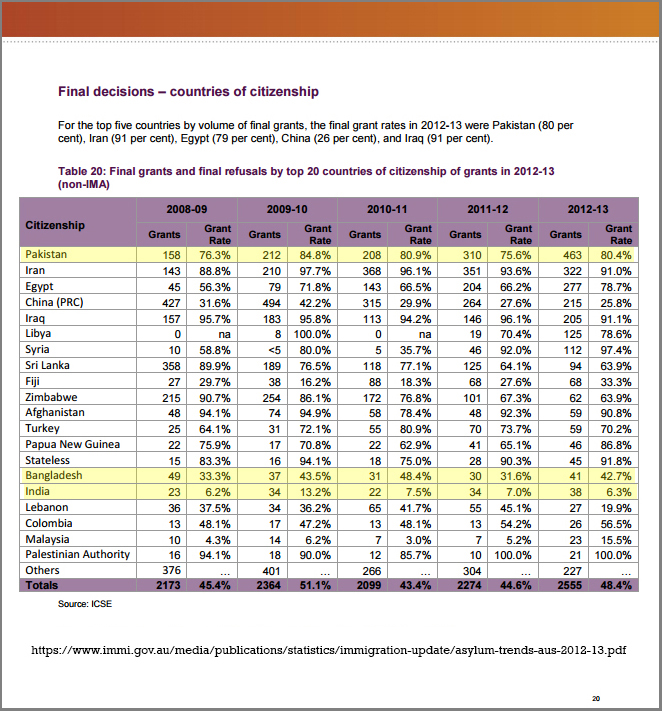
Webcast of Legislative Council Security Panel on 7 July 2015
Jul 8th, 2015 | Government, Immigration, Rejection | Comment
Agenda item no. 4: Unified screening mechanism for non-refoulement claims
LC Paper No. CB(2)1832/14-15(03) – Paper provided by the Administration
LC Paper No. CB(2)1832/14-15(04) – Background brief prepared by the Legislative Council Secretariat
Discussion starts at the 15:39 time marker
